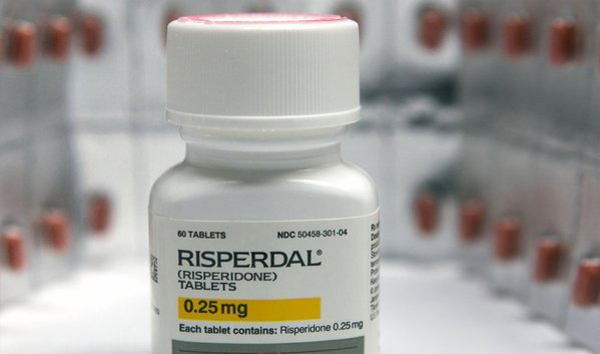By CCHR International
The Mental Health Industry Watchdog
July 11, 2016
On July 1, 2016, a Philadelphia jury awarded $70 million to the family of a boy, Andrew Yount of Tennessee, who developed breasts (gynecomastia) at age 5 after taking Johnson & Johnson unit Janssen Pharmaceuticals’ antipsychotic drug Risperdal. The $70 million is about 30 times larger than a previous judgment awarding $2.5 million.[1] Lawyers for the boy argued that “scientists” for the company were well aware of the risks and sought to downplay them.[2] Citizens Commission on Human Rights (CCHR) International calls for psychiatric researchers, which have an equal if not greater responsibility in clinical trial outcomes being accurately published, to also be investigated. There should be no immunity just because they are paid by a pharmaceutical company.
Responding to the unanimous verdict, attorney Stephen Sheller said, “The jury got angry at these people; they don’t take responsibility.”[3] CCHR says that while J&J/Janssen are being held financially accountable, the “scientists” involved in research who were either involved with or remained silent about the alleged cover-up also need to be named and investigated for any potential prosecution.
“If you were a banker and defrauded your customers, you would go to prison,” Zulfiqar Bhutta, co-director of research for the Centre for Global Child Health at The Hospital for Sick Children in Toronto, said. “If someone defrauds tax payers with research money and falsifies data or falsifies entire research results, it is no different than any other form of similar economic crime.”[4]
Richard Smith, a former editor of The British Medical Journal (BMJ) further explained why researchers should not be above the law: “A man who steals a milk bottle may face a criminal charge. In contrast, a scientist who invents data, defrauds funders, and publishes fabricated data that may lead to patient harm is highly unlikely to face criminal charges.” Further, “It’s deeply uncomfortable for scientists to think that their colleagues may sometimes behave criminally in their work, but nobody should be beyond the law.”[5]
Alexander McCall Smith, emeritus professor of medical law, University of Edinburgh, argues that research misconduct (the gentlemanly phrase for scientific fraud) should be a criminal offence. Adds Richard Smith: “Fraudsters escape because of the incompetence of the institutions, whereas investigation and collection of admissible evidence is the daily job of the police. It’s time, sadly, to criminalize research fraud.”[6]

New York University’s medical school shut down eight studies at its prominent psychiatric research center after finding a series of violations in a study of an experimental, mind-altering drug under lead researcher, psychiatrist Alexander Neumeister.
Research fraud should never be construed as “scientific misconduct.”
Consider the June 27, 2016, The New York Times report about New York University’s medical school shutting down eight studies at its prominent psychiatric research center after finding a series of violations in a study of an experimental, mind-altering drug under lead researcher, psychiatrist Alexander Neumeister. [7] Investigators with the Food and Drug Administration (FDA) also found that records had been falsified and researchers had failed to keep accurate case histories. The violations “jeopardize subject safety and welfare, and raise concerns about the validity and integrity of the data collected at your site,” the F.D.A. said in a letter.[8] In several instances, the agency found, Dr. Neumeister had falsified documents by signing a fellow investigator’s name on reports. There was no penalty leveled at the researchers, other than the university placing Neumeister on leave, after which he submitted his resignation.[9] Neumeister has received consulting fees from Pfizer,[10] the manufacturer of the drug that was being tested.
In September 2015, the British Medical Journal published concerns by experts about a 2001 GlaxoSmithKline study (#329) which many prominent psychiatrists put their name to. It falsely claimed that the antidepressant Paxil was safe and effective for adolescents. There was a decade-long effort by other researchers to uncover the truth about Paxil’s safety for use by adolescents; they found it caused increased harm in this population. Research showed the drug was no better than placebo and caused thought disturbance and suicidal behavior in some youngsters. Consequently, “many thousands of children and adolescents have been harmed, some of them killed, by Paxil and other SSRI” antidepressants.[11]
Dr. Malcom Kendrick, a Scottish doctor and author, rightly questioned, “where the hell is the outrage?…None of the named authors had intervened to correct the record.” Therefore, “surely someone, somewhere, got punished? No they did not.” [12]
However, bringing criminal psychiatric researchers to justice has precedents.
- In 2001, Maria Carmen Palazzo entered into contracts with SmithKline Beecham, Corporation (“SKB”) to carry out clinical drug studies evaluating the efficacy and safety of Paxil in children and adolescents. She failed to comply with the study protocol and to review personally all information regarding the study subjects. The United States government charged Dr. Palazzo for health care fraud and failure to maintain records of the clinical drug studies.[13] Palazzo was sentenced to 13 months in prison after pleading guilty to committing research fraud. This was served concurrently with the sentence to eighty-seven (87) months imprisonment for 39 counts of health care fraud.[14]
-

In 1998 Richard L. Borison pleaded guilty to diverting more than $10 million in research funds. He was sentenced to 15 years in prison, fined $125,000, to be followed by 15-years-probation.
In 1997, Richard L. Borison, M.D., the former chair of the Medical College of Georgia’s (MCG) department of psychiatry and health behavior, and Bruce I. Diamond, Ph.D., once a professor in the department were indicted over diverting more than $10 million in research funds. However, underpinning this was that the two had “irregularities in the medical management of research subjects.” The grand jurors charged that Borison and Diamond “routinely lied to conceal their crimes and endangered the safety of the patients and study participants they were employed to serve, protect and heal.” [Emphasis added] Borison and Diamond conducted research into a broad spectrum of “mental illnesses” and they contracted with pharmaceutical companies throughout the United States and abroad. Their research included clinical trials for drugs such as the antipsychotic olanzapine (Zyprexa) and Risperdal.[15] In 1998 Borison pleaded guilty and was sentenced to 15 years in prison, fined $125,000, to be followed by 15-years-probation. In addition, the court ordered Borison to make restitution in the amount of $4.26 million, $2.5 million to be paid within 30 days of the plea.[16]
- In 1994, Barry Garfinkel the director of child and adolescent psychiatry at the University of Minnesota was sentenced to federal prison for five felonies related to research fraud involving the Ciba-Geigy antidepressant Anafranil (clomipramine). The University of Minnesota kept the fraud secret for four years, until he was finally indicted.[17] Garfinkel falsified data in the $250,000 drug trial. The prosecutor, Assistant United States Attorney Andrew Luger, said that Dr. Garfinkel had treated the study “like a joke,” faking reports on patient examinations that had either never taken place or had been conducted by someone with no medical training. In the study, patients were supposed to come in for regular medical visits to determine if the drug was helping or harming them.[18] Garfinkel appealed but lost.[19] He was sentenced to federal prison and fined.[20]
Fraud may be an intentional deception made for personal gain or to damage another individual by intentionally falsifying and/or fabricating research data and misleading reporting of the results. This can be skewed as “misconduct” when researchers claim there was no intention to harm, even though their failure to follow established protocols could result in risk or harm to humans.[21] The lines should not be blurred. Whether the researchers “intended” to falsify the data or not, when the result is harm to patients, especially to children and the elderly, and those researchers responsible remain silent in the wake of public exposure, they should be held accountable and face the full penalty of the law.
References:
[1] Brendon Pierson, “J&J’s Janssen hit with $70 million verdict in Risperdal trial,” Reuters, 1 July 2016, http://www.reuters.com/article/us-health-johnsonandjohnson-verdict-idUSKCN0ZH5UL
[2] “Philadelphia jury pins $70m verdict on Janssen for its Risperdal drug,” Philly.com, 2 July 2016, http://www.philly.com/philly/business/20160702_Philadelphia_jury_pins__
70m_verdict_on_Janssen_for_its_Risperdal_drug.html
[3] Ibid.
[4] Dawn Papple, “When Scientists Commit Fraud, its ‘Scientific Misconduct’—Should it be Criminal Fraud,” Inquisitr, 25 Oct. 2015, http://www.inquisitr.com/2517436/when-scientists-commit-fraud-its-scientific-misconduct-should-it-be-criminal-fraud/
[5] Richard Smith: If Volkswagen staff can be criminally charged so should fraudulent scientists,” The BMJ, 28 Sept. 2015, http://blogs.bmj.com/bmj/2015/09/28/richard-smith-if-volkswagen-staff-can-be-criminally-charged-so-should-fraudulent-scientists/
[6] Richard Smith, “Should scientific fraud be a criminal offence?” The BMJ, 9 Dec. 2013, http://blogs.bmj.com/bmj/2013/12/09/richard-smith-should-scientific-fraud-be-a-criminal-offence/; http://www.law.ed.ac.uk/people/alexandermccallsmith
[7] Benedict Carey, “An N.Y.U. Study Gone Wrong, and a Top Researcher Dismissed,” The New York Times, 27 June 2016, http://www.nytimes.com/2016/06/28/health/nyu-cannabis-ptsd-psychiatry.html
[8] FDA “Inspections, Compliance, Enforcement and Criminal Investigations,” Alexander Neumeister 2/19/16, http://www.fda.gov/ICECI/EnforcementActions/WarningLetters/2016/ucm493086.htm
[9] Benedict Carey, “An N.Y.U. Study Gone Wrong, and a Top Researcher Dismissed,” The New York Times, 27 June 2016, http://www.nytimes.com/2016/06/28/health/nyu-cannabis-ptsd-psychiatry.html
[10] Robert H Pietrzak, et al., “Cannabinoid Type 1 Receptor Availability in the Amygdala Mediates Threat Processing in Trauma Survivors,” Neuropsychopharmacology, 11 June 2014, http://www.nature.com/npp/journal/v39/n11/full/npp2014110a.html
[11]“BMJ Publishes Study Revealing How Flawed Drug Research Fails a Trusting Public,” BMC, 16 Sept. 2015, http://study329.org/bmj-publishes-study-revealing-how-flawed-drug-research-fails-a-trusting-public-2/
[12] Dr. Malcolm Kendrick, “Study 329 – where the hell is the outrage?” https://drmalcolmkendrick.org/2015/10/01/study-329-where-the-hell-is-the-outrage/
[13] UNITED STATES of America, Plaintiff-Appellant, v. Maria Carmen PALAZZO, M.D., Ph.D., MMM, Defendant-Appellee, No. 07-31119, Decided: February 6, 2009, http://caselaw.findlaw.com/us-5th-circuit/1460463.html
[14] “Jailed Psychiatrist Pleads Guilty and is Sentenced on Charges of Falsified Records of Clinical Trials Involving Children,” Federal Bureau of Investigations, New Orleans Division, 19 Aug 2010, https://www.fbi.gov/neworleans/pressreleases/2010/no081910a.htm.
[15] “Ex-Profs Charged in Psych Department Research Scam,” Psychiatric Times, 1 Apr. 1997, http://www.psychiatrictimes.com/articles/ex-profs-charged-psych-department-research-scam
[16] “ATTORNEY GENERAL ANNOUNCES GUILTY PLEA IN MEDICAL COLLEGE OF GEORGIA FRAUD CASE,” Attorney General of Georgia press release, 8 Oct. 1998, http://law.ga.gov/press-releases/1998-10-09/attorney-general-announces-guilty-plea-medical-college-georgia-fraud-case
[17]“The Deadly Corruption of Clinical Trials: When you risk life and limb to help test a drug, are you helping science—or Big Pharma?” Mother Jones, Sept-Oct issue, 2010, http://www.motherjones.com/environment/2010/09/dan-markingson-drug-trial-astrazeneca
[18] “TOP PSYCHIATRIST IS GUILTY IN FRAUD,” The New York Times, 8 Aug. 1993, http://www.nytimes.com/1993/08/08/us/top-psychiatrist-is-guilty-in-fraud.html
[19] “United States of America, Appellee, v. Barry Garfinkel, Appellant.united States of America, Appellant, v. Barry Garfinkel, Appellee, 29 F.3d 1253 (8th Cir. 1994),” http://law.justia.com/cases/federal/appellate-courts/F3/29/1253/480615/
[20] An Open Letter to Legislators from: Arne H. Carlson, Former Governor of Minnesota; Carl Elliott, M.D. Ph.D., Professor of Bioethics, University of Minnesota, Leigh Turner, Ph.D., Associate Professor of Bioethics, University of Minnesota, et al., Feb 2015, http://postbulletin.typepad.com/files/gov.-carlsons-letter.pdf
[21] Ashwaria Gupta, “Fraud and misconduct in clinical research: A concern,” Perspect Clin Res. 2013 Apr-Jun; 4(2): 144–147, http://www.ncbi.nlm.nih.gov/pmc/articles/PMC3700330/



SHARE YOUR STORY/COMMENT